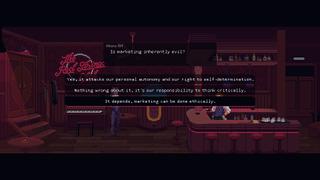What The Red Strings Club teaches us about conversation
In the dialogue-heavy cyberpunk game it doesn't just matter what you say, but how you are understood.

Trying to categorize The Red Strings Club beyond just calling it "an adventure game" feels odd, and yet it's both more and less than that name suggests. While its vibrant pixel art reminds me of some of my favorite point-and-clicks, most of the actual clicking happens in a segment in which I use a pottery wheel to shape cybernetic augmentations out of bio matter.
I play as different characters over the course of The Red Strings Club, each with their own perspective. Early on I control genderless android Akara-184 who, while able to make ethical decisions, has a clear goal—to ensure the happiness of the people who have come to a clinic to be augmented. Akara never communicates with their clients directly—files describe the problem they want fixed and all Akara has to do is choose the correct augmentation to serve their needs.

It's like a warm-up for the more complicated matters to come. Someone wants an implant that will make them more popular on social media and I have to find a way to fulfill that, but what people say they want and what will actually make them happy can be different things. The Red Strings Club then ups the stakes by swapping the augmentations Akara has access to for rogue ones to secretly install in executives of the very company she was built to serve. Unlike regular clients, Akara isn't supposed to interpret the wishes of executives but give them exactly what they ask for. Since Akara is now working with an entirely different set of tools but still trying to follow their programming, this seems impossible. I have to rely on my intuition to decide whether or not it would make the CEO who has been suffering from anxiety attacks happier if given an implant that would make her reject the corporate mindset altogether.
Almost like a morality meter in other games, I have been presented with two different, but equally extreme options—but here both are equally valid. This is The Red Strings Club’s first important takeaway: everything is a matter of interpretation.
Talk the talk
That's especially true of its conversations. The Red Strings Club is all about conversations. We're so used to dialogue in games being a tool to convey information that we spend more time thinking about what is being said than how it's being said. We use what we know to proceed with the plot, and while the opinions we form and emotions we experience are vital to what we think of a game overall, this isn't something most games actively make use of. The Red Strings Club asks us to critically examine our own opinions and those of others in order to take away something that might be useful to how we communicate with each other.
The Red Strings Club turns conversation into a game mechanic
Part of how it succeeds in engaging with our opinions is in treading familiar ground: its story about a corporation manipulating people's mental states using artificial means poses the kind of moral and ethical questions stories like Blade Runner and Brave New World have asked before it. Questions that only become more relevant the more technology, and our use of it, evolves.

Following the Akara segment, I spend a sizable chunk of time as bartender Donovan, owner of the Red Strings Club. Conversation is his daily bread. He is both a shoulder to cry on and an information broker. When he learns of a plan to craft augmentations that not only influence the moods of their wearer but also have the power to influence the non-augmented people around them, he begins to dig for information using a special method of bartending: tuning into the emotions in his patrons and then using their heightened emotional state to get what he needs. While he achieves this through an array of magical cocktails (The Red Strings Club is a work of urban fantasy as well as cyberpunk), at the heart of it Donovan's process of extracting information is rather normal: we know we have a higher chance of getting what we want from someone who is in a good mood, and if we try to change someone’s mind on a topic, we tend to make arguments assuming that person's point of view.
The biggest gaming news, reviews and hardware deals
Keep up to date with the most important stories and the best deals, as picked by the PC Gamer team.
The Red Strings Club turns conversation into a game mechanic by giving us a list of objectives to fulfill, all the while testing our social intuition. What we can glean from a character’s personality based on text and pixels is limited, which becomes obvious when, after each conversation, Akara-184 (who has gone from augmentation artist to bar trainee) asks Donovan 10 questions about his latest guest.
The questions test whether I have paid attention in conversation and whether I can make educated guesses based on what is implied in them. To top it off, Akara asks a question regarding the ethics of what's been discussed.

Up to this last question I am roleplaying Donovan, a man who has his own feelings about ideas like altering emotions, and who reacts cynically to the claim that this technology will mean progress for mankind. All the answers I can choose from reflect his point of view, with varying degrees of bluntness.
...every character feels like they have a whole lifetime of influences and opinions that inform why they might, for instance, condone the use of sentient androids
Once Akara asks Donovan's opinion however, I feel like I take over. When Akara asks if marketing is inherently evil I have a spectrum of possible replies. In every case, Akara challenges the answer, and it feels like they're challenging me.
Akara employs the so-called Socratic Method, a method of questioning the assumptions an answer is based on. Socrates, who believed that the unexamined life is not worth living, kept asking questions until he arrived at a universal truth. The Red Strings Club isn't after a universal truth, but shows us another way to engage in conversation. Where before Donovan would butt heads with his patrons over an issue, meeting an answer with another question is a way for both listener and speaker to interpret what is being said.
The play's the thing
As careful as The Red Strings Club is to tell you not to treat the in-game conversations as a videogame in which you can solve a problem through endless trial and error, it's also very open about being a game. It's meant to be played multiple times, and even goes as far as having a character talk about how game design is a great way to experiment with human reactions.

In presenting us with ways we can interpret information and become aware of the different aspects of conversations, The Red Strings Club might just help us to argue, and most importantly listen, more constructively. The technology that influences our way of talking to each other right now, the internet, social media, forums, and comment sections all make it entirely too easy to say the first thing that comes to our minds.
Each topic can be interpreted in multiple ways, even when the right answer seems obvious. It contrasts emotional, though respectful discussion with a philosophical approach that asks rather than assumes. It provides us with a test chamber in which we can interact with different emotions and see how someone could potentially react to our beliefs. Like in real life, we find ourselves in conversation with people we don't know well, and yet we have to find a way to interpret what they're really saying.
In The Red Strings Club every character feels like they have a whole lifetime of influences and opinions that inform why they might, for instance, condone the use of sentient androids and mind-altering technology. It isn't just a game about the role of social manipulation in our everyday lives, but self-awareness: no one can presume to have all the answers, but by talking to each other we make sense of the world around us.
Most Popular


